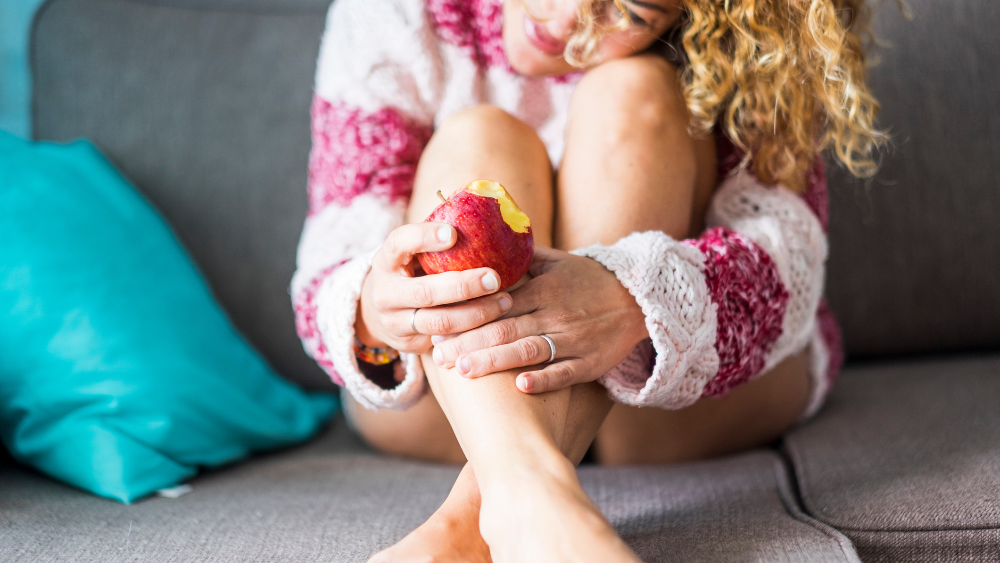
Have you been trying to lose weight for a while but to no avail? You may have fallen for one of these 10 myths. We tell you why you absolutely should not believe them.
In the world of weight loss, we are bombarded with so many different advice that we sometimes can't see the wood for the trees. What is true and what should you absolutely not believe? To steer you in the right direction, we've debunked ten myths that you should definitely not use as a guideline. Are you ready?
Read also: 'These 7 types of fruit are the best to eat if you want to lose weight'
This myth may have arisen because fat contains more calories per gram than carbohydrates and proteins. But fat actually helps to make you feel full for longer, so it can help you lose weight if you eat the good fats. Think avocado, nuts and olive oil. Of course, eating too much fat will make you gain weight, but that is no different with carbohydrates and proteins.
If you want to lose weight, it is good to know how many calories you eat, but also what kind of calories you eat. The macronutrients proteins, carbohydrates and fats each have a different effect on your body and we need a combination of these nutrients to function properly. 200 calories from white bread will surely make you feel different from eating 200 calories from multigrain bread with almond butter.
In line with the previous points, carbohydrates are just as important a part of a healthy diet as fats and proteins. They are the main source of energy for your body and help regulate your digestion. There is a difference between simple carbohydrates and complex carbohydrates. The simple carbohydrates found in processed foods can raise your blood sugar levels and make you gain weight if you consume too much of them. The complex carbohydrates can be found in multi-seed bread, legumes, beans and certain vegetables and can actually help to keep your blood sugar level stable. So it's about eating the right carbohydrates!
Although eating in the evening is not necessarily the best choice for your body, it certainly does not mean that you will gain weight if you eat something in the evening. Of course it depends on what you eat. It turns out that we often make less good choices in the evening when it comes to what we snack on and we mainly choose foods with a high calorie content. You probably guessed it:as soon as you opt for a healthy snack, there is nothing to worry about.
Of course exercise is an important part of the weight loss process, but it does not give you the license to eat everything that is loose and stuck. When you start eating and drinking a lot of products that contain a lot of calories and bring few nutrients with them, you can't compete with that. In addition, it also does not give your body the energy it needs, so you can even exercise less. You can of course take a cookie every now and then, but letting yourself go completely is perhaps a less good idea.
Surely there are companies that claim that taking supplements can help with weight loss, but there is no evidence that this is actually the case or that they also help you keep the weight off once you have lost weight. It is also important to read the labels of the supplements before you even start, because you want to know exactly what you are taking. In any case, supplements are not the key to weight loss success!
Unfortunately, losing weight is not simply a matter of eating breakfast. It will help satisfy your hunger and prevent you from overeating later in the day, but in the end it's still about eating fewer calories in a day than you burn, whether or not that's because you had breakfast. Not a breakfast person? Then that's okay too!
Gluten is a type of protein found in certain grains, such as wheat, barley and rye. You can find gluten in many different healthy products that also contain a lot of fiber, vitamins and minerals. If you don't have celiac disease, gluten is not dangerous and you should eat it. Depending on what you eat, you can actually gain weight if you eat gluten-free. Many processed gluten-free products contain more fats and sugars than their gluten-rich counterparts to improve the taste and texture of the product.
Yes, a lot of running and cycling can help with weight loss. Fortunately, those are not the only ways you can lose some pounds. Strength training also plays an important role in burning fat. With this, you not only build muscle mass – which makes you feel tighter – you also burn more calories at rest and it stimulates your metabolism. In addition, it also has its benefits on your bones and posture. Who will we see in the weight room soon?
It almost seems obvious, but of course healthy food can also be delicious! Seasonal vegetables are often rich in taste and natural sweet fruit is always a joy to eat. Dairy products, lean proteins such as beans and nut butters and seafood also fall under the list of delicious yet healthy products. You can make it as tasty as you want, so this is definitely no excuse anymore!
Source: Womenshealthmag.com/uk